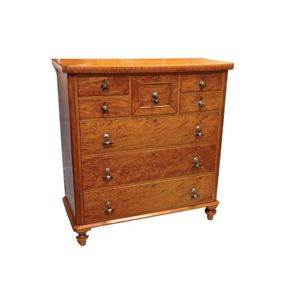William Norrie Kauri Scotch Chest with Original Handles
You must be a subscriber, and be logged in to view price and dealer details.
Subscribe Now to view actual auction price for this item
When you subscribe, you have the option of setting the currency in which to display prices to $Au, $US, $NZ or Stg.
- Kauri - An evergreen conifer tree associated with New Zealand, but also grown in northern Australia, and islands around the Pacific rim including Borneo, Vanuatu and New Guinea. The timber is generally golden in colour, and straight grained without much knotting.
A by-product of the kauri tree was the kauri gum, the fossilised resin extracted from the tree. The gum was obtained through digging, fossicking in treetops, or more drastically, by bleeding live trees. Kauri gum was used in the manufacture of varnishes and other resin-based products, and also crafted into jewellery, keepsakes, and small decorative items.
Kauri forests were prolific in the north of the North Island of New Zealand. European settlers in the 1700 and 1800s realised that the timber from these tall trees with broad trunks would be ideal for ship building and construction and a thriving industry was established harvesting the kauri tree. The forests were substantially reduced, and now the remaining Kauri trees that grow in New Zealand are protected, and there are reserves in various areas of the North Island.
The remaining stands of kauri in New Zealand are under threat from "kauri disease", a microscopic organism that causes dieback in the trees, with vast tracts either dead or dying. - Turned Legs - are legs which have been turned on a lathe. In use from the 16th century, turned legs on tables, chairs and cabinets became more frequent until, by the 1830s, the Georgian square or tapered leg was rarely found except in country pieces.
- Turning - Any part of a piece of furniture that has been turned and shaped with chisels on a lathe. Turned sections include legs, columns, feet, finials, pedestals, stretchers, spindles etc. There have been many varieties and fashions over the centuries: baluster, melon, barley-sugar, bobbin, cotton-reel, rope-twist, and so on. Split turning implies a turned section that has been cut in half lengthwise and applied to a cabinet front as a false decorative support.
- Plinth - The square or rectangular base of a piece of cabinet furniture, often ornamented with moulding. The plinth may be separate, as in some wardrobes or presses, and act as the support for the carcase. In a false plinth, the moulded boards may be attached directly to the piece. Furniture with a plinth base usually does not have separate feet. The term derives from architecture where it denotes the base of a column or statue.
This item has been included into following indexes:
Visually similar items

A good quality N.Z. colonial kauri Scotch chest, with mottled facings, the central top hat drawer with a pair of small drawers on either side and three deep full width drawers below, rounded side edges, deep plinth top, short turned legs and original wood

A Georgian style oak small proportion chest on chest, raised on bracket feet, the base with three full width drawers, the top with four, curving detail to the pediment, brass drop handles with decorative back plates and keyhole escutcheons. 61 cm x 44 cm x

A New Zealand colonial mottled kauri scotch chest, the five top short drawers with crossbanded detail above three full width drawers, all with fancy silvered drop handles, rounded corners to the top, sides and platform base. 120 cm x 50.5 cm x 128 cm

Fred Ward (Australian, 1899-1990), Tall Chest of Drawers, with five drawers and iron pulls, bearing decal label 'Cabinet Maker K. Westra Canberra', (A/F), height 120 cm, width 68.5 cm, depth 54 cm
